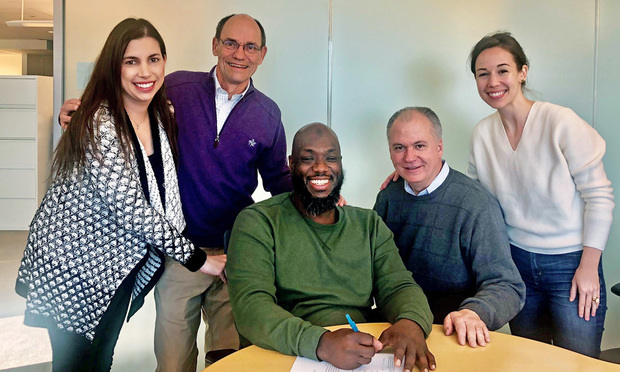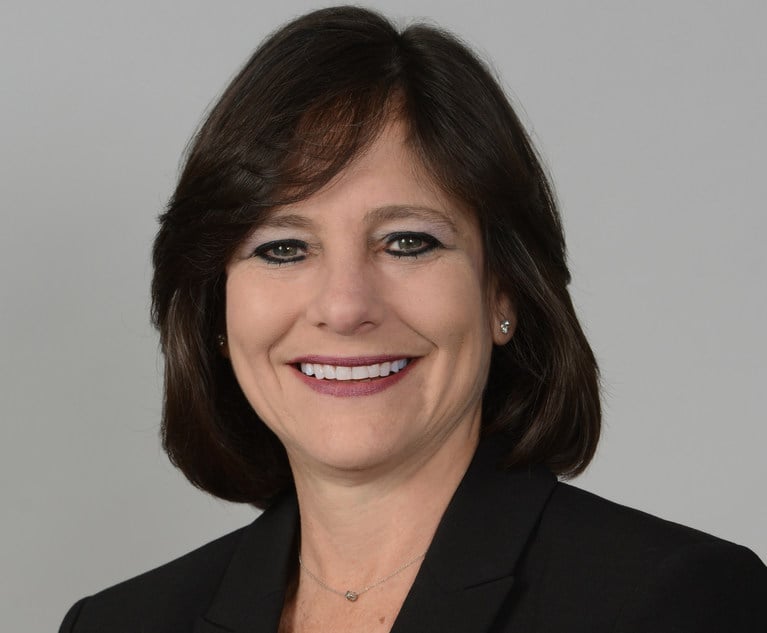Dechert Team Wins Historic Payout for Wrongful Conviction
The settlement is the largest-ever by the city of Philadelphia in a non-DNA exoneration case.
January 06, 2020 at 02:36 PM
3 minute read
 The full Dechert team with (pro bono client) Shaurn Thomas in December in Dechert's office in Philadelphia when he was signing the settlement papers. Left to Right: Tiffany Engsell, Stephen Brown, Shaurn Thomas, Jim Figorski and Stefanie Tubbs.
The full Dechert team with (pro bono client) Shaurn Thomas in December in Dechert's office in Philadelphia when he was signing the settlement papers. Left to Right: Tiffany Engsell, Stephen Brown, Shaurn Thomas, Jim Figorski and Stefanie Tubbs.
Before he became a lawyer, Dechert's James Figorski spent 25 years as a police officer in Philadelphia. That experience proved key, first in winning exoneration for Shaurn Thomas, who served 24 years in prison for a murder he did not commit, and now, in securing a $4.15 million civil settlement from the city of Philadelphia for wrongful conviction.
Moreover, the Dechert pro bono team, which also included civil rights counsel Stephen Brown and associates Tiffany Engsell and Stefanie Tubbs plus co-counsel Paul Messing and David Rudovsky of Kairys, Rudovsky, Messing, Feinberg & Lin, did it all without the aid of DNA evidence.
Instead, after eight years of work, they showed that the detectives involved in the case violated Thomas' Fourth and 14th amendment rights by coercing two witnesses to testify falsely against him, failing to fully investigate his alibi of which they were aware, and hiding exculpatory evidence showing that the two witnesses' coerced testimony was false.
The payout is the largest-ever by the city of Philadelphia in a non-DNA exoneration case.
Figorski, a senior staff attorney in Dechert's litigation department, said he grew interested in becoming a lawyer after spending so much time in court as a cop. "I thought I could do a better job" than many of the lawyers he saw practicing, he said.
Going to school at night, he earned a J.D. from Temple University in 2005. Initially interested in criminal law, he said that "the more I saw in law school, the more interested I became in civil work."
While much of his practice now involves antitrust matters, Figorski has remained active in pro bono matters. When reviewing cases for the Pennsylvania Innocence Project in 2009, he came across Thomas' letter claiming he'd been wrongfully convicted. "It had a ring of truth because I knew the system," Figorski said.
Thomas, who was 16 when Domingo Martinez was gunned down, had been arrested the night before the murder on suspicion of stealing a motorcycle. He claimed he was at Philadelphia's Youth Study Center—part of the city's juvenile justice system—at 9 a.m. the morning of the murder, which took place at 9:55 a.m., though it was difficult to find independent corroboration for his alibi.
Still, Figorski said, it didn't add up. "I had arrested juveniles before. I knew what the system was. It made me want to look deeper."
Once he got his hands of the case files, he was more convinced that there had been a miscarriage of justice. "I knew what should have been there and wasn't, and what was there that was out of place."
Did it feel strange to go up against his old police department in court? "I don't view it as being on the opposite side. I view it as being about telling the truth," Figorski said. "No one is interested in putting an innocent person in prison."
This content has been archived. It is available through our partners, LexisNexis® and Bloomberg Law.
To view this content, please continue to their sites.
Not a Lexis Subscriber?
Subscribe Now
Not a Bloomberg Law Subscriber?
Subscribe Now
NOT FOR REPRINT
© 2025 ALM Global, LLC, All Rights Reserved. Request academic re-use from www.copyright.com. All other uses, submit a request to [email protected]. For more information visit Asset & Logo Licensing.
You Might Like
View All
Big Company Insiders See Technology-Related Disputes Teed Up for 2025

Litigation Leaders: Jason Leckerman of Ballard Spahr on Growing the Department by a Third Via Merger with Lane Powell

Litigation Leaders: Greenspoon Marder’s Beth-Ann Krimsky on What Makes Her Team ‘Prepared, Compassionate and Wicked Smart’
Law Firms Mentioned
Trending Stories
- 1'It's Not Going to Be Pretty': PayPal, Capital One Face Novel Class Actions Over 'Poaching' Commissions Owed Influencers
- 211th Circuit Rejects Trump's Emergency Request as DOJ Prepares to Release Special Counsel's Final Report
- 3Supreme Court Takes Up Challenge to ACA Task Force
- 4'Tragedy of Unspeakable Proportions:' Could Edison, DWP, Face Lawsuits Over LA Wildfires?
- 5Meta Pulls Plug on DEI Programs
Who Got The Work
Michael G. Bongiorno, Andrew Scott Dulberg and Elizabeth E. Driscoll from Wilmer Cutler Pickering Hale and Dorr have stepped in to represent Symbotic Inc., an A.I.-enabled technology platform that focuses on increasing supply chain efficiency, and other defendants in a pending shareholder derivative lawsuit. The case, filed Oct. 2 in Massachusetts District Court by the Brown Law Firm on behalf of Stephen Austen, accuses certain officers and directors of misleading investors in regard to Symbotic's potential for margin growth by failing to disclose that the company was not equipped to timely deploy its systems or manage expenses through project delays. The case, assigned to U.S. District Judge Nathaniel M. Gorton, is 1:24-cv-12522, Austen v. Cohen et al.
Who Got The Work
Edmund Polubinski and Marie Killmond of Davis Polk & Wardwell have entered appearances for data platform software development company MongoDB and other defendants in a pending shareholder derivative lawsuit. The action, filed Oct. 7 in New York Southern District Court by the Brown Law Firm, accuses the company's directors and/or officers of falsely expressing confidence in the company’s restructuring of its sales incentive plan and downplaying the severity of decreases in its upfront commitments. The case is 1:24-cv-07594, Roy v. Ittycheria et al.
Who Got The Work
Amy O. Bruchs and Kurt F. Ellison of Michael Best & Friedrich have entered appearances for Epic Systems Corp. in a pending employment discrimination lawsuit. The suit was filed Sept. 7 in Wisconsin Western District Court by Levine Eisberner LLC and Siri & Glimstad on behalf of a project manager who claims that he was wrongfully terminated after applying for a religious exemption to the defendant's COVID-19 vaccine mandate. The case, assigned to U.S. Magistrate Judge Anita Marie Boor, is 3:24-cv-00630, Secker, Nathan v. Epic Systems Corporation.
Who Got The Work
David X. Sullivan, Thomas J. Finn and Gregory A. Hall from McCarter & English have entered appearances for Sunrun Installation Services in a pending civil rights lawsuit. The complaint was filed Sept. 4 in Connecticut District Court by attorney Robert M. Berke on behalf of former employee George Edward Steins, who was arrested and charged with employing an unregistered home improvement salesperson. The complaint alleges that had Sunrun informed the Connecticut Department of Consumer Protection that the plaintiff's employment had ended in 2017 and that he no longer held Sunrun's home improvement contractor license, he would not have been hit with charges, which were dismissed in May 2024. The case, assigned to U.S. District Judge Jeffrey A. Meyer, is 3:24-cv-01423, Steins v. Sunrun, Inc. et al.
Who Got The Work
Greenberg Traurig shareholder Joshua L. Raskin has entered an appearance for boohoo.com UK Ltd. in a pending patent infringement lawsuit. The suit, filed Sept. 3 in Texas Eastern District Court by Rozier Hardt McDonough on behalf of Alto Dynamics, asserts five patents related to an online shopping platform. The case, assigned to U.S. District Judge Rodney Gilstrap, is 2:24-cv-00719, Alto Dynamics, LLC v. boohoo.com UK Limited.
Featured Firms
Law Offices of Gary Martin Hays & Associates, P.C.
(470) 294-1674
Law Offices of Mark E. Salomone
(857) 444-6468
Smith & Hassler
(713) 739-1250







